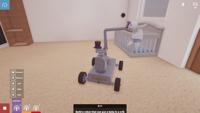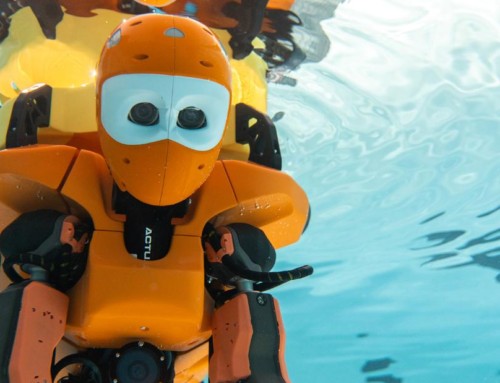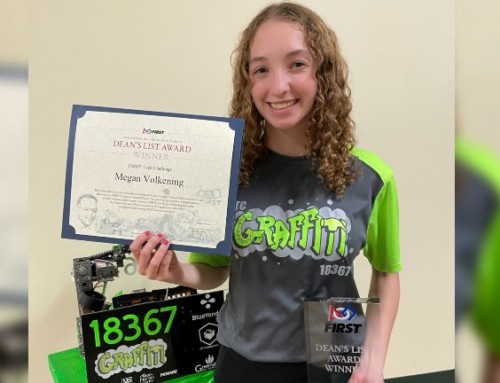[ad_1]
Robotics can be cool — and understandable — even if you’re not an engineer.
And if you learn how to control robots, you could beat the odds of having a robot take over your job some day.
That’s one of the messages of RoboCo, a project by Madison educational games development company Filament Games that’s drawing nearly $1 million in grants from the National Science Foundation (NSF).

The entryway to Filament Games in the 316 Building, 316 W. Washington Ave.
RoboCo is a “virtual robotics kit,” being developed for play both in virtual reality mode and on a personal computer, Filament CEO Dan White said.
It’s not meant to replace the physical act of piecing parts together and wiring circuitry but instead, to present an entrée to the concept of robotics.
“It’s designed to make robotics accessible and fun and interesting, first and foremost,” White said.
“If we can make a highly scaffolded and playful experience that attracts a broader diversity of people to robotics, mainly minorities and women,” more young people might consider entering the field, he said.
Filament received a $225,000 grant to build a prototype in VR format and was recently notified the company has qualified for a phase 2, $750,000 grant to complete the project.
RoboCo is aimed at middle school and high school students, White said. “But we’ve seen adults dive into the game because it’s so deep and complex. We’ve also tested it on some grade school kids,” he said.
Building robots in VR
White said the first stage in devising the game was to come up with “a robust tool set that lets you build any robot you can imagine.” The pieces are “like LEGO parts but with gears, blocks and pulleys,” he said.
The next task was to create scenarios that would spur players to design and build different kinds of robots and then test their robots’ skills.

RoboCo, a game being developed by Madison educational games company Filament Games, will be released in virtual reality and for use on a computer. This introduction to robotics will ask the bots created by players to perform such challenges as putting a baby in a crib.
“In robotics, there is a challenge. Do a pull-up, push a ball across a room, flip over another robot,” White said. RoboCo calls for virtual bots to try some more unusual exercises as well, such as putting a lively baby in a crib, cooking a fancy dinner or winning a robot dance contest.
The early robot models that players build are often klunky, White said, but as they learn, the designs become more sophisticated and functional, and players get more rewards from the game.
Over the next year, Filament will continue to develop and fine-tune RoboCo for the Oculus Quest cordless VR headset and controllers and for computer use, White said.

In Filament Games’ RoboCo game, students will be asked to put together robots — and make a fashion statement with their creations.
“There are a lot of things games can teach,” he said. “We’re primarily interested in … future-facing skills that won’t be jeopardized by the rise of robots taking over people’s jobs in the next 15 years.”
An artificial intelligence expert, Kai Fu Lee, interviewed in January on CBS’ “60 Minutes,” predicted that robots will replace humans in 40 percent of the jobs worldwide, with most of the disruption occurring in the next 15 to 25 years.
White said Filament wants to help teach students how to “build robots — so you won’t eventually be replaced by them.”
Other Filament games
RoboCo is one of about 10 games in progress at Filament, White said, many of them with prestigious partners. They include:
- Beats Empire lets players run a music studio and record label, in a project for Columbia University’s Teachers College. Aimed at middle school students in New York City, the game has players hire musicians and decide where to release their songs based on residents of the borough and their music preferences, said Filament vice president of sales Jennifer Javornik. The mission of the game: To test students on their computer science data analysis skills.
- RoboSellers is an entrepreneurship game for Junior Achievement. Elementary students are taught about the role of money in daily life and how to budget for expenses in an “updated, fun take on the traditional concept of the lemonade stand,” Javornik said.
- Cyberscape, an introduction to computer science, is being developed in partnership with New York University and funded by private investors in China.
Founded in 2006, Filament Games has 44 employees at its Downtown offices, at 316 W. Washington Ave.

Filament Games shares a kitchen and break room with Understory, an advanced weather data company, at 316 W. Washington Ave.
Revenue in 2018 was nearly $5 million, White said.
Games the company has made over the past dozen years tackle subjects ranging from civics lessons to the solar system to plant genetics to CPR (cardiopulmonary resuscitation).
“We like to think (that) if you have a weird thing you want to make, you call Filament Games,” Javornik said. “Our studio just thrives on that.”
[ad_2]
Source link





Leave A Comment
You must be logged in to post a comment.